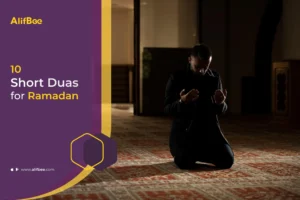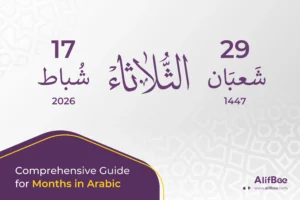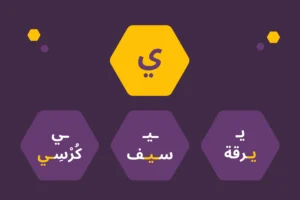
Short Duas for Ramadan in Arabic and English
Short Duas for Ramadan in Arabic and English. Learn short supplications in Arabic and English to connect with Allah (SWT) this holy month. Download Free Daily Dua PDF
To celebrate Eid al-Fitr every year, people start exchanging eid wishes in Arabic, ahead of the Eid break and as they meet each other in Eid.
Eid al-fitr wishes and greetings are common, and they might vary slightly from country to another or from dialect to another.
Eid al-Fitr in 2025 is expected to be either on Sunday, March 30 or Monday March 31.
The exact start date of Eid al-Fitr may vary slightly depending on the sighting of the moon.
Did You Know?
Eid al-Fitr (or Eid ul Fitr) varies its date each year based on the Islamic lunar calendar.
Do you want to learn how to say Eid wishes and greetings to your friends and family in Arabic?
In today’s blog, we will share with you 6 Eid Al-Fitr Arabic greetings and wishes that can be used to spread joy and happiness with the arrival of this special occasion
ʻYdukum mubārkun
This is the most common Arabic greeting in Eid al-Fitr. People also say “Eid Mubarak” عيد مبارك.It is used to congratulate Muslims on the completion of the month of Ramadan. It can be translated to “Your happy holiday is blessed”.
Kullu ʻāmin wʼntum bikhyr
This is also a frequently used Arabic greeting in Eid Al-Fitr and in many holidays and special days, such as Eid Al-Adha, Hijri New Year, the start of Ramadan, New Year’s, and even birthdays. The phrase translates to “Wishing you well every year.”
ʻYdu fiṭrin saʻydin
This phrase is simple and direct. You can use it to wish others a happy Eid Al-Fitr.
ʻAsākum min ʻwwādih
This Eid greeting is also very common, especially in Saudi Arabia and other Gulf countries. It translated to “ May you celebrate it repeatedly”.
Tqbbala allhu ṭāʻatakum
This phrase is more of a supplication added to common greetings. It asks Allah to ask the prayer and fasting performed in the holy month of Ramadan. It translated to “May Allah accept your obedience”.
(Kllu sntin wʼntum sālimwn)
This is another common greeting that is used to congratulate Muslims on the coming of Eid and the completion of the month of fasting. Like كل عام وأنتم بخير, it is used in other Islamic holidays and it translates to “Every year, may you be safe”.
Finally, we wish our dear readers, Arabic language learners, and the Muslim community a Happy Eid. May your Eid al-Fitr this year be blessed and joyful.
Eid Mubarak!
Are you interested in reading more blogs about Ramadan? Check out our blog on Ramadan rituals and what they mean here.
If you liked this blog and felt interested in learning more about the Arabic Language, we invite you to learn more through our unique learning app.
The app offers a wide range of exercises tailored to suit all skill levels and includes quick lessons prepared by our language experts, and daily scenarios rich with Arabic culture. The app also features live statistics for easy and insightful progress tracking.
Author
Dania is a teacher, translator, and content writer with a passion for making Arabic accessible and enjoyable for learners around the world. As the Blog Manager at AlifBee, she writes educational blogs that blend language tips, cultural insights, and practical learning strategies to support every Arabic learner’s journey.

Achieve incredible results with our platform Learn Arabic Online with AlifBee

Join AlifBee Virtual School and master Arabic at your pace — from guided coaching to interactive self-learning.

Learn Arabic faster with live, one-on-one sessions tailored to your level and goals.

Explore AlifBee’s complete range of Arabic learning books for all ages!

Short Duas for Ramadan in Arabic and English. Learn short supplications in Arabic and English to connect with Allah (SWT) this holy month. Download Free Daily Dua PDF

Learn how to say months in Arabic with clear tables, pronunciation tips, and explanations of Gregorian and Hijri calendars for learners.

Learn how to say OK in Arabic! Discover common phrases and useful words like *tayyib* & * tamam* to use in everyday Egyptian Arabic conversation.

Learn about the Arabic letter Yaa (ي). Discover the letter Yaa’s pronunciation in the Arabic alphabet. Explore how to write the letter Yaa (ي).